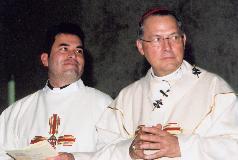The Guest List
(Twenty-Second Sunday, Year C)
As we begin a new school year, I heard a sobering statistic. It had to do with the effectiveness of our religious education programs. A study showed that 75% of our Catholic youth stop practicing their faith by the end of their teenage years. In other words, by the time they turn twenty, ¾ of young Catholics will not attend Sunday Mass or in any visible way practice their faith. The study indicated the reason was not that they had stopped believing. Rather they thought it just did not matter. They had come to this conclusion: God will accept me no matter what I do, so what difference does it make if I go to Mass or obey the commandments? If in the end, everyone goes to heaven, why worry?
Our Scripture readings challenge this attitude. Last Sunday Jesus spoke about the narrow gate which many would not be able to enter. Today’s readings describe a “festal gathering” of angel and saints (Heb 12:22) and a wedding banquet which prefigures the heavenly one. (Lk 14:14) Each of us is free to attend – or to stay away.
Let me give a comparison for what it would be like to be left out. Here in Seattle everyone (even non-sports fans like myself) knows the Mariners, for the first time, are on the way to the World Series. Imagine what a celebration that will be for our town! To remain aloof would take a particular sort of determination.
I was in Rome when Italy faced Brazil for the World Soccer Cup. Because of the time difference, the Italians watched the match in the middle of the night. The noise was so loud, no one could sleep. I didn’t mind because I had to stay up to cram for final exams. But also the excitement of the city was contagious. These kinds of events give a small, imperfect taste of what the heavenly banquet might be like, when we open our souls to Being itself. Who would want to be left out?
Yet it is possible to not enter. Jesus gives a reason why many stay away. Look who’s on the guest list: the poor, crippled, blind and lame. (Lk 14:13) I remember once visiting a parish to concelebrate Mass. Having arrived early, I knelt to pray. Shortly, a lady came into the same pew. By her determined look, I thought she was going to introduce herself to the visiting priest. Saying nothing she formed a wedge with her hands so I sat back to let her by. Evidently, I made the mistake of occupying her accustomed spot! We have all kinds at our Sunday Masses.
I don’t think this was what Jesus referred to when he spoke about being careful where you recline at the banquet. However, it does apply to the need for humility. Some of the other guests may bring us down a notch or two.
C.S. Lewis writes about his decision to attend Mass after his conversion to Christianity. A university don, he was suddenly sitting in the pews with people very different from himself. At first it was humbling, but little by little he realized how necessary for him to have communion with the lame, the crippled, the blind and the poor. Above all, to see his true self in them.
To enter the banquet requires an inner discipline. Archbishop Huntahusen used to point of that it is impossible to be a disciple without discipline. The two words are almost the same. But inner discipline, balanced with humility, is something only God can give it to us. We must allow him to work.
Last week I was with family of four children: a daughter four and a half, a son three, a baby girl of one year and the fourth in utero. After dinner I was playing with the children, letting them ride my back and giving them “floor spins.” As it got near bedtime, I was a little nervous because I remembered my nephews and nieces. Bedtime was always a battle. “Mom, can’t we stay up a little longer? Dad, just a few more minutes.”
When it was about 8:30, the mom said, “OK, kids time for bed.” They stopped playing, gave everyone in the room a kiss and marched upstairs to bed.
I was amazed, dumbfounded. “How did you do it?” I asked.
The mom said, “My husband is a good father. He believes in discipline.”
God is the very best of fathers. He knows we need discipline to be happy. The author of Hebrews says that is what our present sufferings and trials are all about. When you experience them, know that God loves you - and is preparing you for a place at his banquet.
**********
Pictures of Ordination of Deacon Armando Perez (Holy Family Parish; July 15, 2001)

Spanish Version
From Archives (22nd Sunday, Year C):
2007: The Beauty of Humility
2004: Arrogance and Vainglory
2001: The Guest List
1998: Saved by Grace Alone
Bulletin (Birthday, Geezer Glut, Root Error)
Announcements
Seapadre Homilies:
Cycle A, Cycle B, Cycle C
Other Homilies
Proclaiming the Gospel (Foto by Natty)
Seattle Columnist Joel Connelly Responds to Anti-Catholic Stereotyping: "On issues from AIDS to stem cell research, Catholic teaching and 'the Vatican' get described as medieval obstacles to 21st century progress. Archbishop Alex Brunett is wondering whose agenda and what purpose is being served."
Germaine Greer on Birth Control
Response from JoAnne: "What we term suffering is only discipline"
Home
